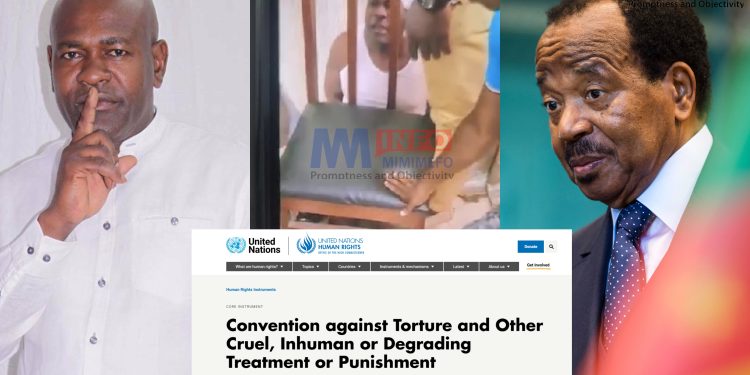On October 23rd, popular Cameroonian musician and social activist Longue Longue released a harrowing video showing the torture he endured at the hands of Cameroonian security forces in 2019. The footage has sparked widespread outrage and renewed scrutiny of Cameroon’s human rights record. In addition to violating the UN Convention against torture, it raises serious concerns about the country’s commitment to international legal standards.
The authorities reportedly tortured the artist after they arrested him on unspecified charges, though many believe his outspoken activism and criticism of government policies contributed to his arrest. The video shows Longue Longue positioned under a chair while someone beats the soles of his feet severely with a machete, a punishment that violates Cameroon’s obligations under the United Nations Convention Against Torture.
Violation of the UN Convention Against Torture
Cameroon ratified the UN Convention Against Torture on December 19, 1986, which legally binds it to prevent and punish acts of torture. However, the brutal treatment of Longue Longue is being condemned as a direct violation of several core principles of the convention. The UN General Assembly adopted the United Nations Convention Against Torture on December 10, 1984. It came into force on June 26, 1987.
Article 1 of the convention defines torture as the intentional infliction of severe physical or mental pain for purposes such as obtaining information, punishment, or intimidation. The video showing the musician being beaten as a form of punishment for his public dissent clearly violates this fundamental article.
Moreover, Article 2 obligates signatory states to take effective measures to prevent acts of torture within their jurisdiction. The actions of the security forces, as depicted in the video, highlight a failure by the Cameroonian government to prevent such practices, raising concerns about the prevalence of torture in detention centres across the country.
In terms of accountability, Article 12 mandates prompt and impartial investigations into all allegations of torture. However, despite the release of this damning footage, there has been no formal announcement of an inquiry into the incident, further fueling criticism of the government’s unwillingness to address abuses committed by its security forces.
Not an Isolated Incident
The torture of Longue Longue is not an isolated incident. Recent human rights reports implicate both government forces and non-state actors in acts of torture and other cruel, inhuman, or degrading treatment.Various contexts have documented these abuses, including the conflict in the Northwest and Southwest regions, as well as in the fight against Boko Haram.
For example, the U.S. Department of State’s 2023 Human Rights Report on Cameroon highlights credible reports of torture by security forces, including the use of machetes and other forms of physical abuse. Amnesty International has also reported on the use of torture by Cameroonian security forces against individuals accused of supporting Boko Haram.
Public Outrage and Calls for Justice
Since the video went viral on October 23rd, Cameroonian authorities have remained largely silent. Meanwhile, the footage has sparked a national and international outcry, with many condemning it as a gross violation of human rights by those tasked with protecting the public.
Joshua Osih, the National Chairman of the Social Democratic Front (SDF), called the actions depicted in the video “inhuman abuse by our law enforcement officers.” He further demanded “an investigation to establish those responsible.”
Barrister Michele Ndoki called for accountability.
“This is not just an attack on one man but on the dignity and humanity of every Cameroonian,” she said. “Torture has no place in our society, and we must stand together to demand justice and accountability.”
Support for Longue Longue has flooded social media, with many expressing solidarity and outrage. Cameroonian content creator Mr. Seksi recreated the chilling scene from the video while singing the national anthem, questioning the country’s commitment to democracy. “If power belongs to the people, are they ready for a new Cameroon?” he asked, adding that Cameroon excels in “oppression, dictatorship, and no freedom of expression.”
Government Response and Potential Diplomatic Fallout
As of now, the Cameroonian government has yet to respond publicly to the video or the growing calls for accountability. Analysts warn that the lack of action could strain Cameroon’s international relations, particularly in light of its obligations under human rights treaties.
Cameroon has come under increasing international criticism in recent years for its handling of political dissidents and activists, with allegations of torture becoming a focal point. The government consistently denies that its security forces systematically employ torture, despite repeated concerns from international human rights organisations.
The video of Longue Longue’s torture not only exposes the ongoing human rights violations within the country but also casts doubt on Cameroon’s commitment to its obligations under the UN Convention Against Torture. His ordeal has become emblematic of the impunity with which security forces operate, often without fear of reprisal or investigation.
In a separate video, Longue Longue revealed that he has filed lawsuits both in Cameroon and in France, seeking justice for the torture he endured. This bold move is set to increase pressure on the Cameroonian authorities to tackle these violations and ensure accountability for those responsible.
What Next?
The release of the video depicting Longue Longue’s torture has ignited a firestorm of criticism against the Cameroonian government. As the nation faces mounting calls for justice, the international community will be watching closely to see whether Cameroon will take meaningful steps towards accountability or continue to allow such violations to persist unchecked.
This case, which highlights the ongoing problem of torture in Cameroon, is a grim reminder of the urgent need for reform within the country’s security and justice systems. Longue Longue’s experience may be just one of many, but his decision to speak out could help bring about the change that countless others are waiting for.



